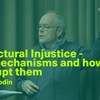disrupt
Bob Goodin: Structural injustice - its mechanisms and how to disrupt them
Place:At the Institute for Futures Studies, Holländargatan 13, Stockholm, or online. Research seminar with Bob Goodin Distinguished Professor of Philosophy and Social and Political theory at the Austra for his "acuity and success endeavored to blend political philosophy with empirical political science to increase the understanding of how decent and dignified societies can be shaped.wherehowmechanismsJoin the seminar online or at the Institute for Futures Studies. If you will join on site, please check the box in the .

Bob Goodin: Structural injustice - its mechanisms and how to disrupt them
Injustices that are, in the first instance, brute acts of clearly identifiable individuals are often perpetuated, more subtly, through seemingly innocent workings of anonymous and innocuous social str
Is conservative opposition to climate change threat-based? Articulating an integrated threat model of climate change attitudes
British Journal of Social Psychology Abstract Throughout the literature, there are assertions that those endorsing conservative ideologies reject the science and solutions of climate change due to perce
Anger and disgust shape judgments of social sanctions across cultures, especially in high individual autonomy societies
Nature Scientific Reports Abstract When someone violates a social norm, others may think that some sanction would be appropriate. We examine how the experience of emotions like anger and disgust relate
Climate Change Denial among Radical Right-Wing Supporters
i: Sustainability The linkage between political right-wing orientation and climate change denial is extensively studied. However, previous research has almost exclusively focused on the mainstream righ= 2216), a mainstream right-wing party (the Conservative Party,,= 634), and a mainstream center-left party (Social Democrats,= 548) in Sweden. Across the analyses, distrust of public service media (Swedish Television,), socioeconomic right-wing attitudes, and antifeminist attitudes outperformed the effects of anti-immigration attitudes and political distrust in explaining climate change denial, perhaps because of a lesser distinguishing capability of the latter mentioned variables. For example, virtually all Sweden Democrat supporters oppose immigration. Furthermore, the effects of party support, conservative ideologies, and belief in conspiracies were relatively weak, and vanished or substantially weakened in the full models. Our results suggest that socioeconomic attitudes (characteristic for the mainstream right) and exclusionary sociocultural attitudes and institutional distrust (characteristic for the contemporary European radical right) are important predictors of climate change denial, and more important than party support per se.

Reducing populations' vulnerabilities to mis-disinformation related to scientific content
The purpose of this project is to develop evidence-based strategies to address populations’ vulnerabilities to scientific mis-disinformation.
On revolutions
Palgrave Communications, volume 6, Article number: 4 (2020). doi.org/10.1057/s41599-019-0371-1 Abstract Sometimes the normal course of events is disrupted by a particularly swift and profound change. His
On Revolutions
Working Paper SERIES 2018:63 THE VARIETIES OF DEMOCRACY INSTITUTE, University of Gothenburg, Dept of Political Science. Abstract Sometimes the normal course of events is disrupted by a particularly swif
Saved by the Dark Forest: How a Multitude of Extraterrestrial Civilizations Can Prevent a Hobbesian Trap
The Monist, Volume 107, Issue 2, April 2024, Pages 176–189 Abstract The possibility of extraterrestrial intelligence (ETI) exists despite no observed evidence, and the risks and benefits of actively sea
Malcolm Fairbrother (presenter): How Much Do People Value Future Generations? (paper together with Gustaf Arrhenius, Krister Bykvist, Tim Campbell, webinar)
Malcolm Fairbrother is professor of sociology at Umeå University and researcher at the Institute for Futures Studies. In this seminar he presents the paper How Much Do People Value Future Generations? C








